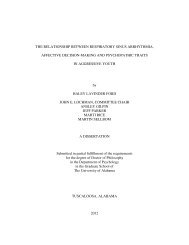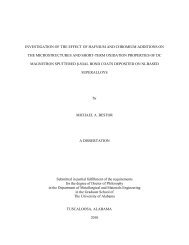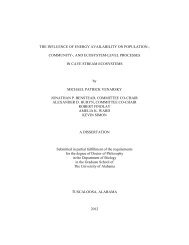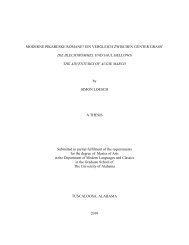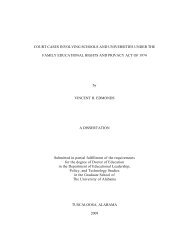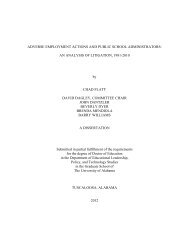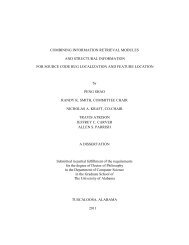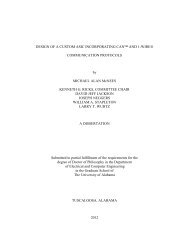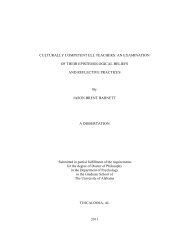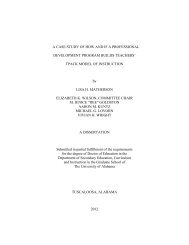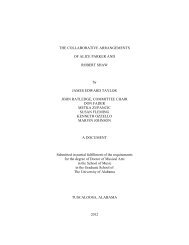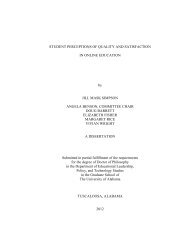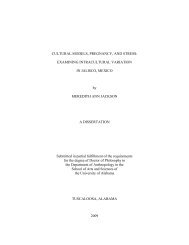Copyright Malvin Porter, Jr. 2010 - acumen - The University of ...
Copyright Malvin Porter, Jr. 2010 - acumen - The University of ...
Copyright Malvin Porter, Jr. 2010 - acumen - The University of ...
Create successful ePaper yourself
Turn your PDF publications into a flip-book with our unique Google optimized e-Paper software.
Other research suggests that children who receive adult support are better able to cope<br />
with bullying. Conners-Burrow and colleagues (2009) found that support from parents and<br />
teachers buffers the level <strong>of</strong> depression for four groups <strong>of</strong> children involved in bullying (victim,<br />
bully, bully/victims, or not involved children). Children who were not involved in bullying<br />
reported less depression and more social support than children involved in bullying.<br />
Bully/victims were the most at-risk group. For all groups except victims, when parental support<br />
was low, support from teachers was associated with fewer symptoms <strong>of</strong> depression. Flashpohler<br />
and colleagues (2009) found that peer and teacher support might mitigate the impact <strong>of</strong> bullying<br />
on the quality <strong>of</strong> life <strong>of</strong> victims. <strong>The</strong>se studies support the value <strong>of</strong> promoting social support<br />
from parents, peers and teachers in bullying prevention programs and school climate initiatives.<br />
<strong>The</strong>se results further highlight the positive contributions <strong>of</strong> bystanders in support <strong>of</strong> school-wide<br />
bullying prevention/school climate strategies.<br />
Other research has found that effective educational interventions teach children to<br />
enhance cognitive and social performance by understanding others’ perspectives, which can be<br />
correlated with their social adjustment (Rubin, Provenzano, & Luria, 1974). It is argued that<br />
developing the ability to understand reciprocal perspective-taking skills are related to the<br />
development <strong>of</strong> conventional moral thought (Selman, 1971). Social perspective-taking <strong>of</strong><br />
aggressive children has been found to be lower than that <strong>of</strong> more socially competent peers<br />
(Chandler, 1973). Perspective taking can be viewed in terms <strong>of</strong> empathy, which has been related<br />
to both altruistic and antisocial behavior (Marcus, 1980). Empathic children identify with the<br />
distress <strong>of</strong> another person, while sympathetic children can accurately read another’s distress<br />
without being emotionally overwhelmed with the pain <strong>of</strong> the other (Eisenberg & Fabes, 1990).<br />
49



